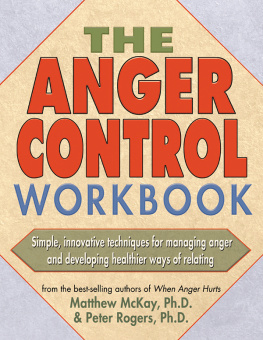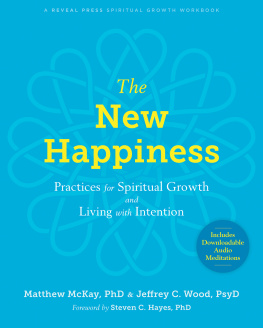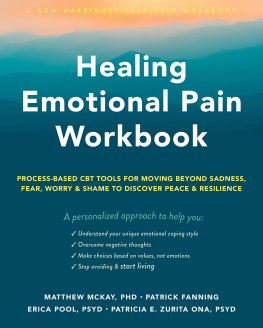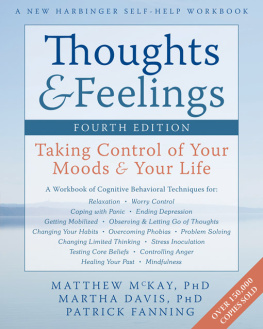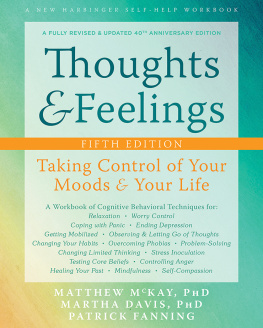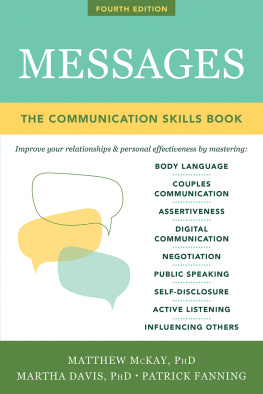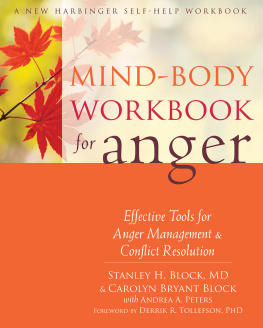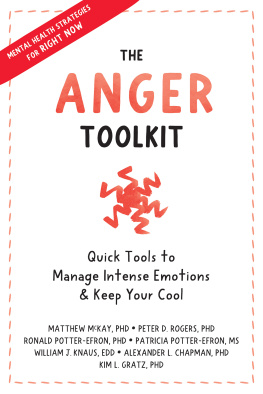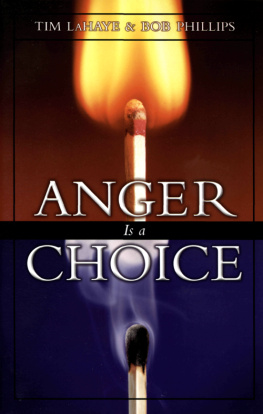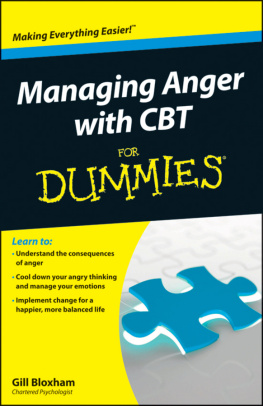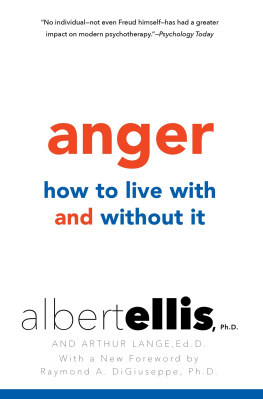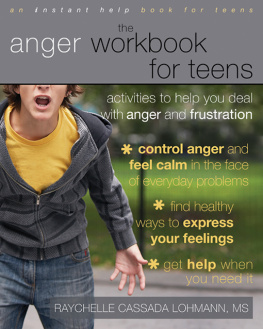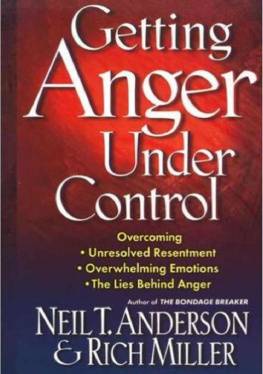The Anger Control Workbook
The Anger Control Workbook
by Matthew McKay, Ph.D. and Peter D. Rogers, Ph.D.
New Harbinger Publications
Publishers Note
This publication is designed to provide accurate and authoritative information in regard to the subject matter covered. It is sold with the understanding that the publisher is not engaged in rendering psychological, financial, legal, or other professional services. If expert assistance or counseling is needed, the services of a competent professional should be sought.
Distributed in the U.S.A. by Publishers Group West; in Canada by Raincoast Books; in Great Britain by Airlift Book Company, Ltd.; in South Africa by Real Books, Ltd.; in Australia by Boobook; and in New Zealand by Tandem Press.
Copyright 2000 by Matthew McKay and Peter D. Rogers
New Harbinger Publications, Inc.
5674 Shattuck Avenue
Oakland, CA 94609
Cover design by Lightbourne Images
Edited by Heather Garnos
Library of Congress number: 00-134871
ISBN: 1-5722-4220-5 Paperback
ISBN: 978-1-608-824-1-37 Epub
All Rights Reserved
New Harbinger Publications Web site address: www.newharbinger.com
This book is dedicated to all the people Ive ever loved. And especially those who have loved me back.
P.D.R.
For Noah Landis and Wendy Millstine, whove shown me a lot about having a passion for life.
M.M.
Contents
We wish to acknowledge the extraordinary body of research by Jerry L. Deffenbacher, Ph.D., which has greatly advanced our knowledge of anger and its treatment, and is the basis of the core anger management program presented in this book.
As psychologists with a combined fifty-two years in practice, weve come to some conclusions about the problem of anger:
- For most people, chronic anger covers incredible pain. And while anger often feels like a release at the moment, it inevitably makes the underlying pain worse.
- Of those people who suffered the greatest damage in childhood, most were harmed by repeated exposure to anger. The majority of chronically angry people were also damaged by anger as children.
- People struggling with chronic anger suffer long-term consequences in both work and personal relationships. They tend to feel more alone, more disappointed by life, and less nourished by their relationships.
- The greatest predictor of satisfaction in marriage is how people learn to handle conflict and anger.
- Anger is a learned response, and the anger response can be unlearned with commitment and effort.
Anger is ubiquitous in our society, from road rage to the soaring incidence of child physical abuse. Everyone is touched by it. Over the years, and tens of thousands of hours of therapy, we have seen what it costs our clientsboth those who struggle with overwhelming bouts of anger, and those who are its victims. The regret, the loss, the hurt and fear leave deep scars on everyone.
Because weve seen so much pain associated with anger, we wrote, in 1989, a book called When Anger Hurts. The response to this book has shown us just how important the issue of anger has become. More than 200,000 copies are now in print. The book has been used as a text in anger management courses at Kaiser Permanente and the Nursing Education of America, as well as clinics and adult education programs all over North America. Hundreds of therapists regularly assign the book as homework for clients with anger problems. Many dozens of readers have contacted us to express their appreciation, and sometimes to offer suggestions for future publications.
One of the most frequent suggestions weve gotten regards the need for a step-by-step workbook that teaches anger management through a series of structured exercises. Less theory and more practice, someone said. Another reader asked for a sequence of skill-building exercises that teach what you need to know in the order you need to learn it.
The Anger Control Workbook has grown from these requests. This book is all about acquiring, in a step-by-step format, the skills you need to better manage anger. There are no fancy explanations, no wasted words. Just key information, along with exercises that will give you greater control over your anger response. The techniques you will learn here are proven. In study after study, relaxation techniques combined with cognitive restructuring and anger inoculation have helped to lower the frequency and intensity of anger. They will work for you tooif you commit the time and effort to actually do the exercises in this book.
The Anger Control Workbook is, unfortunately, work. It takes practice to master anger control skills. Reading wont be enough. Hoping to change wont be enough. Youve already done that, and you now know that wishes and hopes are forgotten with the next outburst. You need to turn hope into actiona commitment to work your way, stepwise, through each chapter in the workbook, and to practice the new skills until they start to become second nature.
While the work wont be easy, we promise you that the reading will be. Everything you need to do is carefully and clearly explained. There are lots of examples. Worksheets help you organize your efforts, and learning is broken into small steps so nothing feels overwhelming. You will find that each chapter is set up to help you change in increments, and from the very beginning you will be given new tools to start acting differently.
Everything you need to know to overcome anger is here. Just keep reading. And working. Well be there to help you every step of the way.
Matthew McKay
Peter D. Rogers
Calistoga, California
April 2000
CHAPTER 1
Youre reading this book because you want to change. Chances are youre been struggling with anger for a long time, and you dont like how it affects you and those you love. Looking back, you can remember plenty of situations where you said or did things out of anger that you later wished deeply you could undo. And youve probably resolvedmany timesto speak more calmly or gently, to be more understanding and less blaming, or simply to keep the lid on.
It hasnt worked. You remembered for a few hours or a few days. Then something pushed your buttons and before you knew it, all your best intentions were swept away. You may have felt guilty and baddisgusted with yourself that your reactions seemed so automatic, so difficult to control. Perhaps you have felt helpless, watching yet another wave of anger sweep over you. It wells up in your stomach, flooding you with the need to shout and blame.
For some people, anger feels more like a cold rage, deep and poisonous. It leaks out a little at a time but never resolves, never heals. Something is terribly wrong or unfair; you feel trapped and in pain. Nothing you do seems to make it better, so the anger sets up housekeeping in your gut.
Anger isnt always about the current annoyancethis nitwit who cant take a message, or the person who cut in front of you at the toll plaza. Often the roots of anger can be traced back to earlier times when you were hurt, abused, or neglected in your family of origin. The pain was something you carried, year after year. It may have left scars so that now its hard to feel safe or loved or truly worthy. Sometimes it doesnt take much of a provocation to trigger those feelings of being unloved, unworthy, or unsafeand the anger rises up right alongside that old pain.
From the very start, its important to get one thing straight. You arent to blame because you struggle with anger. You are not a bad person because youve forgottenperhaps repeatedlyall your resolutions to be cool and calm. Rather, you are a person in pain. Whether the pain is occasional or chronic, when it hits, it feels overwhelming. Its a wave that drives you into a state of mind where nothing matters but expressing what you feel. You shout it out. No matter who gets hurt or whatever the consequences.

